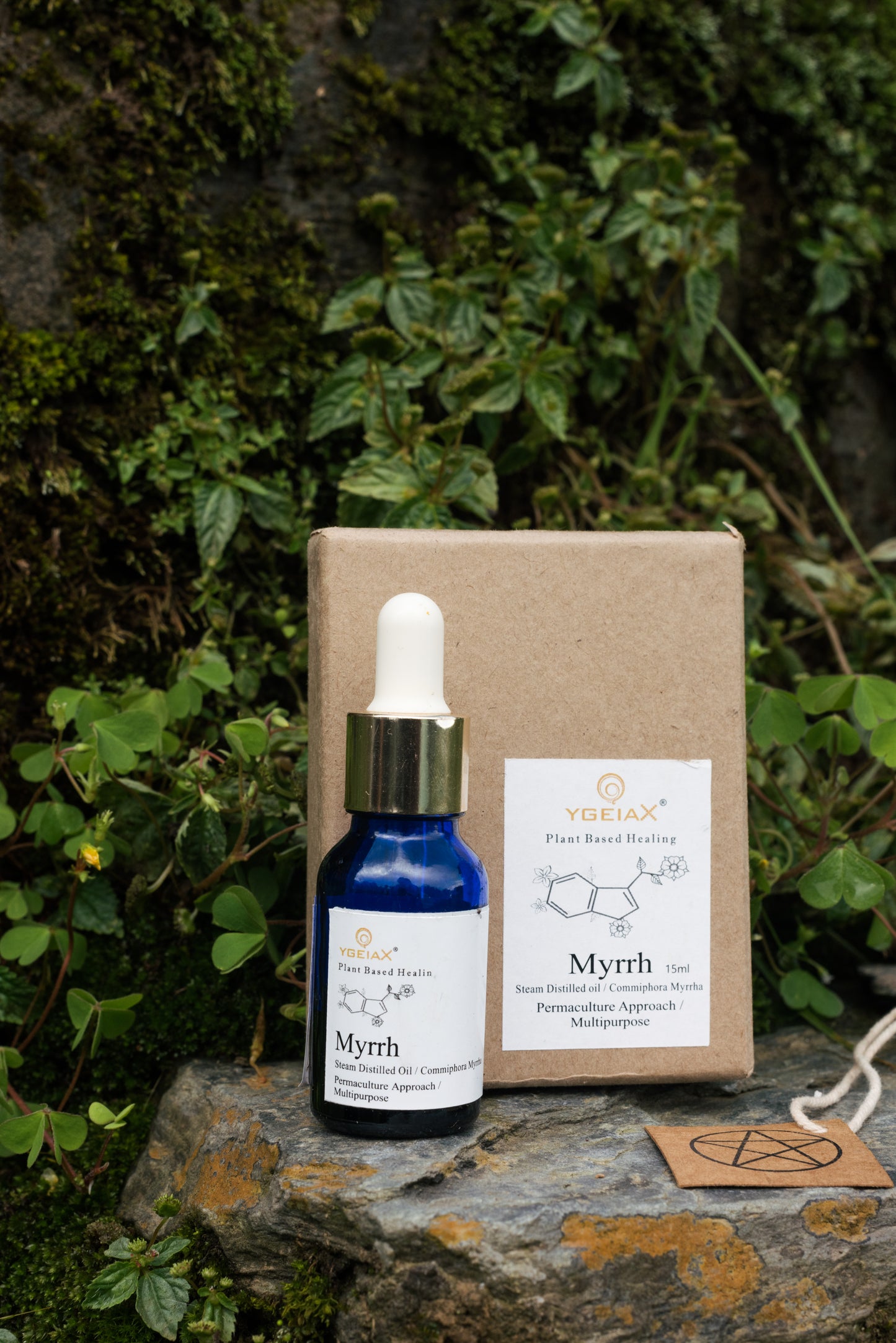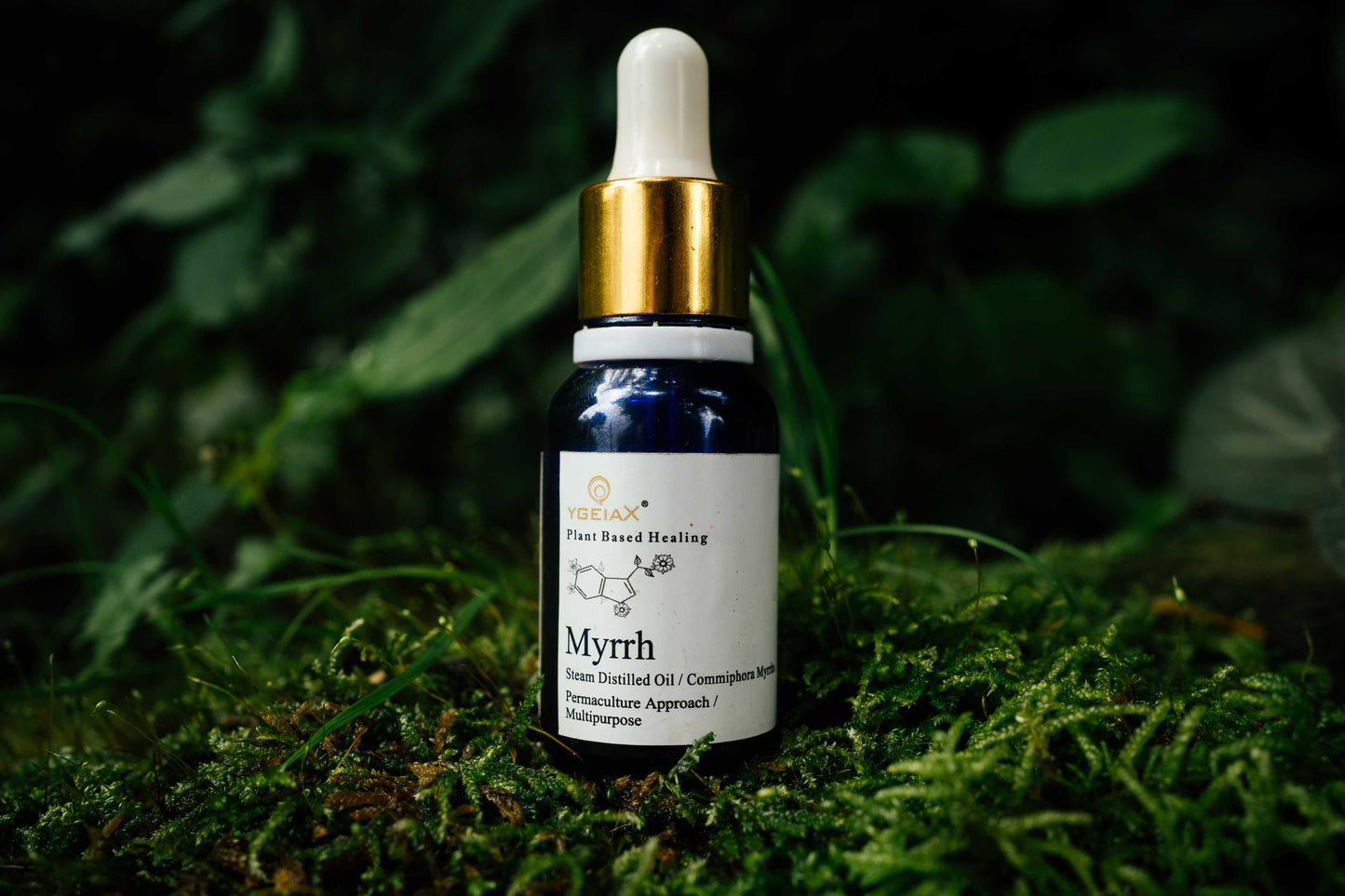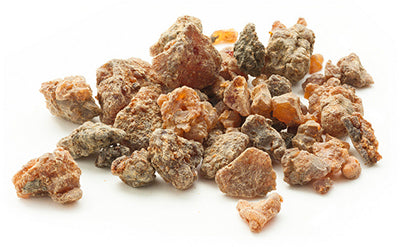Myrhh Steam Distilled Oil
Myrhh Steam Distilled Oil
Couldn't load pickup availability
Myrrh is most commonly known as one of the gifts (along with gold and frankincense) the three wise men brought to Jesus in the New Testament. In fact, it was actually mentioned in the Bible 152 times because it was an important herb of the bible used as a spice, natural remedy and to purify the dead.
Myrrh oil is still commonly used today as a remedy for a variety of ailments. Researchers have become interested in myrrh due to its potent antioxidant activity and potential as a cancer treatment. It has also been shown to be effective in fighting certain types of parasitic infections.
What Is Myrrh?
Myrrh is a resin, or sap-like substance, that comes from the Commiphora myrrha tree, common in Africa and the Middle East. It is one of the most widely used essential oils in the world.
The myrrh tree is distinctive due to its white flowers and knotted trunk. At times, the tree has very few leaves due to the dry desert conditions where it grows. It can sometimes take on an odd and twisted shape due to the harsh weather and wind.
In order to harvest myrrh, the tree trunks must be cut into to release the resin. The resin is allowed to dry and begins to look like tears all along the tree trunk. The resin is then collected, and the essential oil is made from the sap via steam distillation.
The oil is a yellowish, orange color with a viscous consistency. It is commonly used as a base for perfume and other fragrances.
Two primary active compounds are found in myrrh, terpenoids and sesquiterpenes, both of which have anti-inflammatory and antioxidant effects. Sesquiterpenes specifically also have an effect on our emotional centre in the hypothalamus, helping us remain calm and balanced.
Both of these compounds are under investigation for their anticancer and antibacterial benefits, as well as other potential therapeutic uses.
History of Myrhh
Myrrh essential oil has been used for thousands of years in traditional healing therapies and religious ceremonies. Common myrrh oil uses historically include:
- Fragrance
- Embalming
- Flavoring for food
- Treating hay fever
- As an antiseptic to clean and treat wounds
- As a paste to help stop bleeding
The Chinese frequently used myrrh as a medicine, and it remains a part of traditional Chinese medicine to this day. The main myrrh oil use by the Egyptians was for embalming, and Jewish people used it to make the holy anointing oil that was used in worship services.
The most common historical myrrh oil use was to burn the resin over hot coals. This would release a mysterious, spiritual quality into any room before a religious ceremony.
It has also been used in aromatherapy for its meditative quality or for prayer usually in combination with frankincense.
The smell of myrrh has been traditionally thought of as a symbol of suffering, burned at funerals or other solemn events. At times, however, it is blended with citrus oils to help produce a more uplifting aroma. These lighter blends have been used to help promote inspiration and emotional insight.
Benefits of Myrhh
1. Potent Antioxidant
A 2010 animal-based study in the Journal of Food and Chemical Toxicology found that myrrh could protect against liver damage in rabbits due to its high antioxidant capacity. There may be some potential for uses in humans also.
It’s also been shown in rats with autoimmune issues to have anti-inflammatory properties thanks to its antioxidant content.
2. Anti-Cancer Benefits
A lab-based study found that myrrh also has potential anticancer benefits. The researchers found that myrrh was able to reduce the proliferation or replication of human cancer cells.
They found that myrrh inhibited growth in eight different types of cancer cells, specifically gynecological cancers. Although further research is needed to determine exactly how to use myrrh for cancer treatment, this initial research is promising.
Furthermore, research published in 2022 found “evidence for the methanolic extract of myrrh having cytotoxic activity against cancer cells and anti-inflammatory wound-healing properties, which may be attributed to its role in modulating macrophage function. Furthermore, we suggest the active constituents responsible for these properties, which warrants further studies focusing on the precise roles of the active metabolites.”
3. Antibacterial and Antifungal Benefits
Historically, myrrh was used to treat wounds and prevent infections. It can still be used in this manner on minor fungal irritations, such as athlete’s foot, bad breath, ringworm (all of which can be caused by candida) and acne.
Myrrh oil can help fight certain types of bacteria as well. For example, it seems in lab studies to be potent against S. aureus infections (staph). The antibacterial properties of myrrh oil seem to be amplified when it’s used along with frankincense oil, another popular biblical oil.
Apply a few drops to a clean towel first before applying it directly to the skin.
4. Anti-Parasitic
A medication has been developed using myrrh as a treatment for fascioliasis, a parasitic worm infection that infects humans worldwide. This parasite is generally transmitted by ingesting aquatic algae and other plants.
A medication made with myrrh was able to decrease symptoms of the infection, as well as a drop in parasite egg count found in the faeces.
It’s also been shown to be effective in protecting against other adult worms.
5. Skin Health
Myrrh can help maintain healthy skin by soothing chapped or cracked patches. It is commonly added to skin care products to help with moisturizing and for fragrance. Ancient Egyptians used it to prevent aging and maintain healthy skin.
A research study in 2010 discovered that topical application of myrrh oil helped elevate white blood cells around skin wounds, leading to faster healing.
6. Relaxation
Myrrh is commonly used in aromatherapy for massages. It can also be added to a warm bath or applied directly to the skin, and it’s been shown to have muscle-relaxing properties in research.
7. Relief for Upper Respiratory Problems
It may work as an expectorant to help relieve the symptoms of coughs and cold. Try this oil to to relieve congestion and help reduce phlegm.
8. Decrease in Digestive Problems
Another popular myrrh oil use is to help relieve digestive problems, such as stomach upset, diarrhea and indigestion.
9. Helps Prevent Gum Disease and Mouth Infections
Due to its anti-inflammatory and antibacterial properties, myrrh can help relieve inflammation of the mouth and gums caused by diseases such as gingivitis and mouth ulcers. It can also be used as mouth rinse to prevent gum disease.
It can freshen your breath and is commonly used as an ingredient in mouthwash and toothpaste.
10. Helps Treat Hypothyroidism
Myrrh is a remedy for hypothyroidism, or a low functioning thyroid, in traditional Chinese medicine and Ayurvedic medicine. Certain compounds in myrrh may be responsible for its thyroid-stimulating effects.
Put two to three drops directly onto the thyroid area daily to help decrease symptoms.
11. May Help Treat Skin Cancer
As discussed above, myrrh is being studied for its potential anticancer benefits. It has been shown to be beneficial against skin cancer cells in laboratory studies.
Consider using it in addition to other traditional treatments if you have been diagnosed with skin cancer. Apply a few drops per day directly onto the cancer site, always testing a small area first.
12. Treatment for Ulcers and Wounds
Myrrh has the power to increase the function of white blood cells, critical for wound healing. It was found to decrease the incidence of ulcers and improve their healing time in a study published in the Journal of Immunotoxicology.
A primary myrrh oil use is as a fungicide or antiseptic. It can help reduce fungal infections, such as athlete’s foot or ringworm, when applied directly to the affected area. It can also be used on small scrapes and wounds to prevent infection.
Myrrh can help strengthen the body’s cells by acting as an astringent. It was used traditionally to help stop bleeding. Due to its astringent effects, it may also help prevent hair loss by strengthening the roots in the scalp.
15ml
Share






